This reaction essay is part of the Brookings project—”The One Percent Problem: Muslims in the West and the Rise of the New Populists.” We asked each author to reflect on how reading the other working papers helped them think differently about their own country of focus.
When reading and discussing the other papers in this project, I repeatedly noticed that my own country of focus — the Netherlands, in which Geert Wilders and other Party for Freedom (PVV) representatives have intensely politicized the issue of Islam over the last 15 years — constitutes a rather extreme case. First, there is the salience of the issue of Islam within the PVV’s political discourse. In Wilders’ worldview, Islam constitutes by far the most important threat facing the Netherlands — a threat he qualifies as “existential” and addresses extensively, in books, tweets, and even short movies. In none of the other papers did I encounter a similar fixation. Indeed, rather than the issue, Wilders’ political friends tend to portray Islam as an issue. An important issue, to be sure, yet still an issue among others.
Similarly, only Wilders’ PVV seems to claim that Islam has negative consequences for quite literally all facets of society — instead of a few, such as national identity or security. This all-encompassing articulation makes the PVV quite unique, both within and outside the Netherlands. This unique character of the Dutch case also concerns a party that has recently emerged, partly as a response to the “right-wing” political climate fostered by the PVV — Denk, the first “immigrant party” in western democracies that, favored by the openness of the proportional Dutch political system, has managed to get elected in national parliament in 2017, describing itself explicitly as a party “many Muslims will feel comfortable with.”
Besides the remarkable issue salience and broad relevance of Islam in the PVV’s discourse, Wilders’ party is also an outlier when it comes to its definition of the latter, namely as “a totalitarian ideology.” The working paper on Denmark is the only other one in which this characterization emerged, but without the relatively extreme plans that the Dutch Party for Freedom has offered over the years, such as a tax of 1,000 euros on wearing headscarves, a ban on the Quran, and a proposal to close down all mosques in the Netherlands. During the last general election, “de-Islamizing the Netherlands” had even become “the core” of Wilders’ policy proposals.
The PVV is also an outlier when it comes to the way it portrays Islam with respect to the “native” people. Here, as with the other right-wing populist parties examined in this project, nativism constitutes the key feature of the PVV’s political discourse. This exclusionary form of nationalism relates to the idea “that states should be inhabited exclusively by members of the native group (the nation) and that non-native elements (persons and ideas) are fundamentally threatening to the homogeneous nation-state.” Nativism, however, comes in different guises based on appeals to different threats (e.g., in terms of security, culture, religion, and welfare provision) in opposition to different out-groups and shaped by diverging contexts. Accordingly, the things these radical conservative parties want to conserve differ across time and space, including the very nature of the collective identity they try to revive through their nativist appeals (“Radical” conservative parties in the etymological sense of “radix”, i.e., the defense of cultural roots).
In that light, it is interesting to compare the PVV with other parties studied in this project. Operating in a context — characterized by a broad support for abortion, gay marriage, and women’s rights — Wilders and other PVV politicians tend to denounce Islamic culture as intolerant, sexist, and homophobic, while defending progressive values, such as tolerance, women emancipation, and gay rights, thereby presenting the latter as achievements of a superior, “native” Dutch culture. When conceiving the PVV as an extreme case from this angle, one can observe a remarkable continuum of positions, ranging from radical right-wing parties in the secular, historically predominantly Protestant parts of North-western Europe (Denmark, Germany, Sweden, and especially the Netherlands) — where Islam-alarmist rhetoric is mostly based on appeals to progressive values — to the less secularist (predominantly) Catholic parts of southern and eastern Europe (Italy, Poland, Hungary, and even areas of France), where more “traditional” and religious values tend to be propagated by these parties in their criticism of Islam.
To be sure, Wilders also emphasizes the religious roots of secular values, thereby following the example of his political mentor Frits Bolkesteijn, the leader of the liberal-conservative governmental party People’s Party for Freedom and Democracy (VVD) from 1990 to 1998, as well as his political precursor Pim Fortuyn. For instance, in a December 2013 open letter to Pope Francis, the PVV leader posited that the modern values of tolerance and the separation of Church and State are part of “the West’s Judeo-Christian and humanistic civilization.” Interestingly, the leader of the new national conservative, anti-establishment party Forum for Democracy (FvD) Thierry Baudet — who considers himself a “cultural Christian” (cultuurchristen) — goes even further in his flirtation with Christianity, describing the latter as an important source of “who we are” as a Western civilization. When push comes to shove, however, Forum for Democracy, just like the PVV, constitutes a liberal party in terms of ethical-moral issues, such as abortion, gender equality, and gay rights — in stark contrast to nativist anti-establishment parties in Southern and Eastern Europe.
To some extent, the United States could be associated with the latter, and be situated near the “traditional” end of this spectrum, as religion still plays an important role in public life. The American case is still quite different from most European cases, however, in the sense that the issue of Islam plays a comparatively smaller role in the debate over immigration (and the political perceptions of Trump supporters). To be sure, the proportional number of Muslims is relatively low in the U.S., whereas demographic change and perceived “Islamization” have become increasingly intertwined in the political debate in Western European countries. This connection does not forcibly correspond to the current migrant flows. In the Netherlands, for instance, most immigrants that arrived in the past decade are of Polish descent.
Unlike the U.S. though, this is also the case in Eastern European countries where the number of Muslim migrants is extremely small, such as Poland and Hungary. In that light, I found the papers on these two countries very interesting, as the authors pointed to the “platonic” dimension of anti-Islam sentiment, that is, alarmism in the absence of significant Muslim communities. Due to the geographical position of Europe, however, future migration flows are more likely to stem from Muslim countries than is the case in the United States. Together with historical oppositions between the European (Christian) and Islamic world, this prospect — and thus potential relevance — helps to understand why political leaders in European countries with low numbers invoke the issue more frequently than in the U.S., where migration flows mainly stem from Latin America. This is a reminder to all of us to pay more attention to the political supply side in the construction of ideas around “enemies” of “the people.”
This is a reminder to all of us to pay more attention to the political supply side in the construction of ideas around “enemies” of “the people.”
A similar top-down perspective not only fits the broader project in general, but also relates to a particular aspect I found quite interesting when reading and discussing the papers, namely the transatlantic travel of Islam-alarmist ideas. For example, the right-wing backlash that altered the Dutch political landscape from the 1990s onward, was strongly inspired by American thinkers such as Bernard Lewis and Samuel Huntington. Yet, during the last decade, Geert Wilders and his Islam-related ideas frequently crossed the Atlantic in the opposite direction. Besides becoming an author on Breitbart, he developed a broad network in the U.S. and gained access to Republican members of congress such as Michelle Bachman, Jon Kyl, Steve King, and Louis Gohmert. Wilders even attended the 2016 Republican Party Convention where Donald Trump was officially nominated. Although the PVV leader never met the 45th American president in person, many people surrounding him do know Wilders personally. According to Dutch journalist Freke Vuijst, they include John Bolton, Michael Flynn, Steve Bannon, Jeff Sessions, and Rick Perry, among others. Indeed, these transatlantic connections — generally related to the PVV leader’s fight against Islam — again emphasize Wilders’ status as an extreme case in comparison to his political friends in Europe. Nonetheless, this relative extremism hasn’t necessarily blunted his influence.
The Brookings Institution is committed to quality, independence, and impact.
We are supported by a diverse array of funders. In line with our values and policies, each Brookings publication represents the sole views of its author(s).
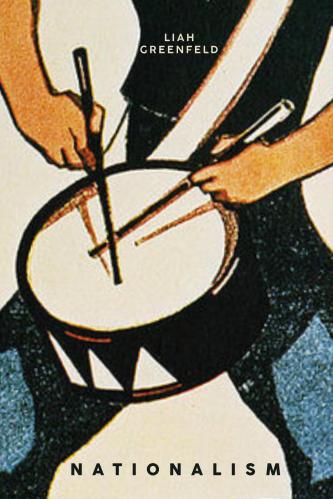
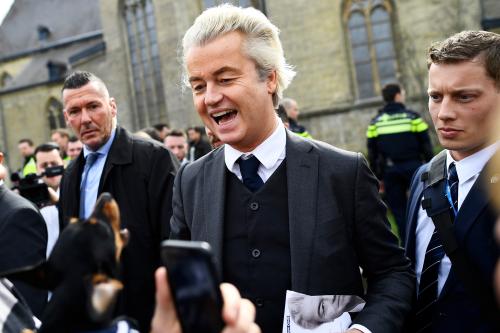
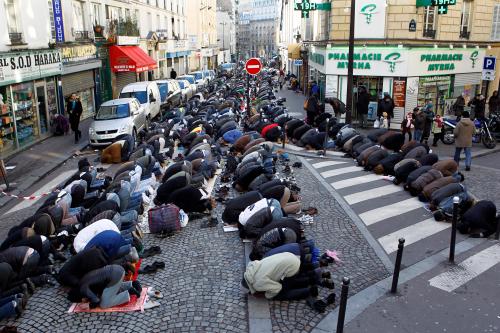

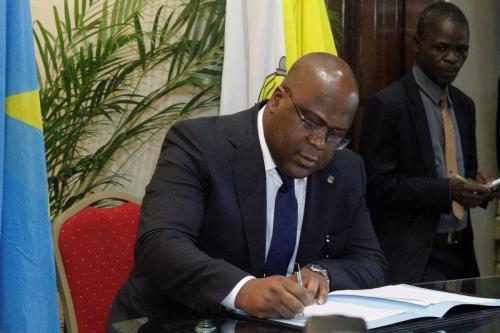
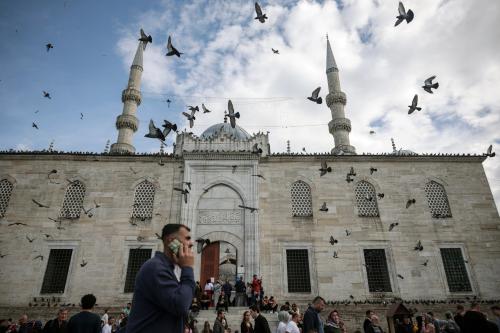
Commentary
Why Dutch populists are exceptional
A 'Muslims in the West' reaction essay
December 4, 2019